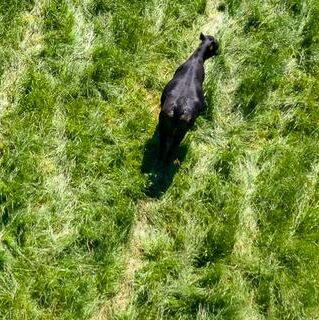USDA Funds Five-Year Project to Explore Drone Use in Herding and Monitoring
The University of Kentucky’s Martin-Gatton College of Agriculture, Food and Environment has received a $910,000 grant from the U.S. Department of Agriculture (USDA) to advance the use of drone technology in livestock management. The five-year project, titled “Precision Livestock Management: Cattle Monitoring and Herding Using Cooperative Drones,” will focus on using drones to assist cattle producers in herding, monitoring, and gathering data on beef cattle.
Biosystems and Agricultral Engineering Professor Dr. Josh Jackson used drones to monitor the health of beef cattle at his farm outside Salvisa, Ky.
This initiative aims to reduce labor demands and improve the efficiency of operations for farmers.
Advancing Cattle Herding Technology
The project continues the university’s efforts to integrate technology into agriculture. Josh Jackson, assistant extension professor in the Department of Biosystems and Agricultural Engineering (BAE) and the project’s principal investigator, explained the team’s goals. “We’ve previously worked on cattle monitoring using drones, but now our team is exploring how these drones can be used for herding,” Jackson said. “The idea is to see if we can move cattle with drones in an effective and safe way for the animals.”
Key objectives of the research include developing a multi-agent drone control system capable of semi-autonomous operation around cattle. This system will adjust to the animals’ behavior and movement, ensuring safe interactions between the drones and the herd.
The team will also study how different breeds of cattle respond to drones. Jackson emphasized the importance of understanding these reactions, stating, “We’re interested in how cattle of various breeds respond to the drones. For instance, we’ve seen in our previous work that one drone flying 30 feet above ground level doesn’t bother them much, but if you introduce a second drone or change the flight pattern, their response changes.”
Developing New Monitoring Methods
Another major goal of the research is to create methods for estimating cattle weight through drone imagery. Using aerial photographs to develop 3D models, the team hopes to accurately estimate the weight of cattle without needing to handle them directly. Jackson noted the potential impact of this technology, saying, “If we can get within 5% accuracy using drones, it could revolutionize how farmers monitor the health and growth of their herds.”
The project will also investigate the economic viability of using drones in cattle production. On-farm trials will assess the cost-effectiveness of deploying drones in operations of various sizes and determine the number of drones needed to optimize herd management.
“Farmers want to know if this technology makes sense financially,” Jackson said. “While it might not be cost-effective right now, there’s potential for future advancements to make it more accessible and affordable.”
Interdisciplinary Collaboration for Practical Solutions
The University of Kentucky’s research team includes experts from mechanical and aerospace engineering, agricultural economics, and veterinary science, ensuring a comprehensive approach to the technical and practical challenges of drone deployment.
Michael Sama, Gatton Foundation Distinguished Professor and director of graduate studies, highlighted the value of this interdisciplinary collaboration. “We’ve come a long way in just a few years researching drone use for livestock management and are looking forward to where this project leads us,” Sama said.
The research will ultimately aim to develop guidelines and tools for livestock producers across the country. Jackson expressed optimism about the project’s potential impact, stating, “The outcomes could pave the way for more widespread use of drones in agriculture. This would offer a new approach to livestock management that saves time, reduces labor and potentially improves animal welfare.”
A Broader Impact on Agriculture
The BAE program at the University of Kentucky is a partnership between the Martin-Gatton College of Agriculture, Food and Environment and the Stanley and Karen Pigman College of Engineering. This research project aligns with the university’s broader mission to serve the Commonwealth through innovation in education and research.
The project is supported by the National Institute of Food and Agriculture, part of the USDA, under award number 2024-69014-42393. As a land-grant institution, the University of Kentucky continues to focus on advancing agriculture and supporting the next generation of leaders in the industry.
Read more:
Miriam McNabb is the Editor-in-Chief of DRONELIFE and CEO of JobForDrones, a professional drone services marketplace, and a fascinated observer of the emerging drone industry and the regulatory environment for drones. Miriam has penned over 3,000 articles focused on the commercial drone space and is an international speaker and recognized figure in the industry. Miriam has a degree from the University of Chicago and over 20 years of experience in high tech sales and marketing for new technologies.For drone industry consulting or writing, Email Miriam.
TWITTER:@spaldingbarker
Subscribe to DroneLife here.

